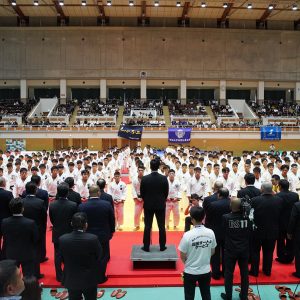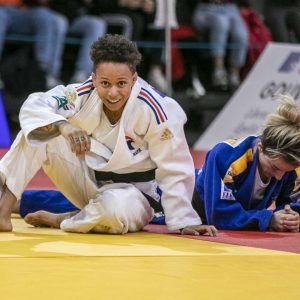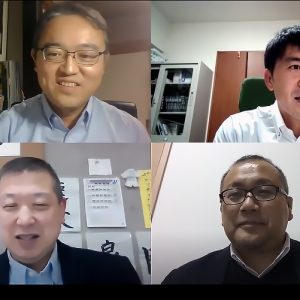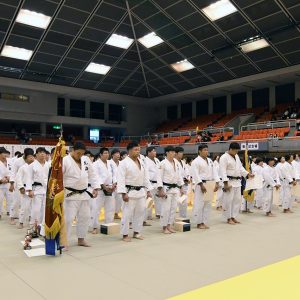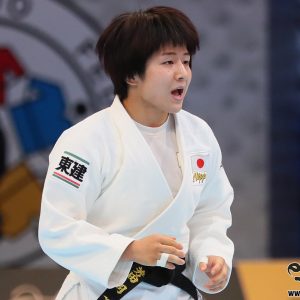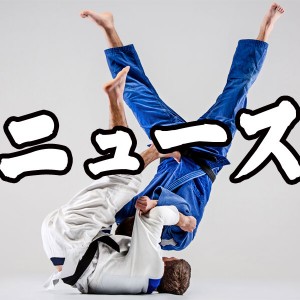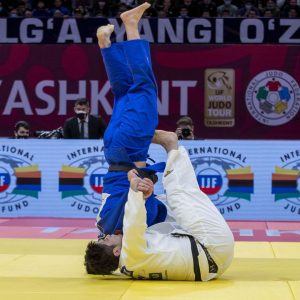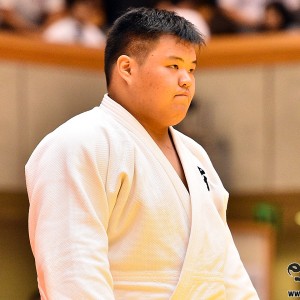[Interview] Uta ABE talks about her enthusiasm for the Doha World Championships: “It will be the hardest battle. I will win with my courageous judo.”
by EJUDO, Japanese judo website.
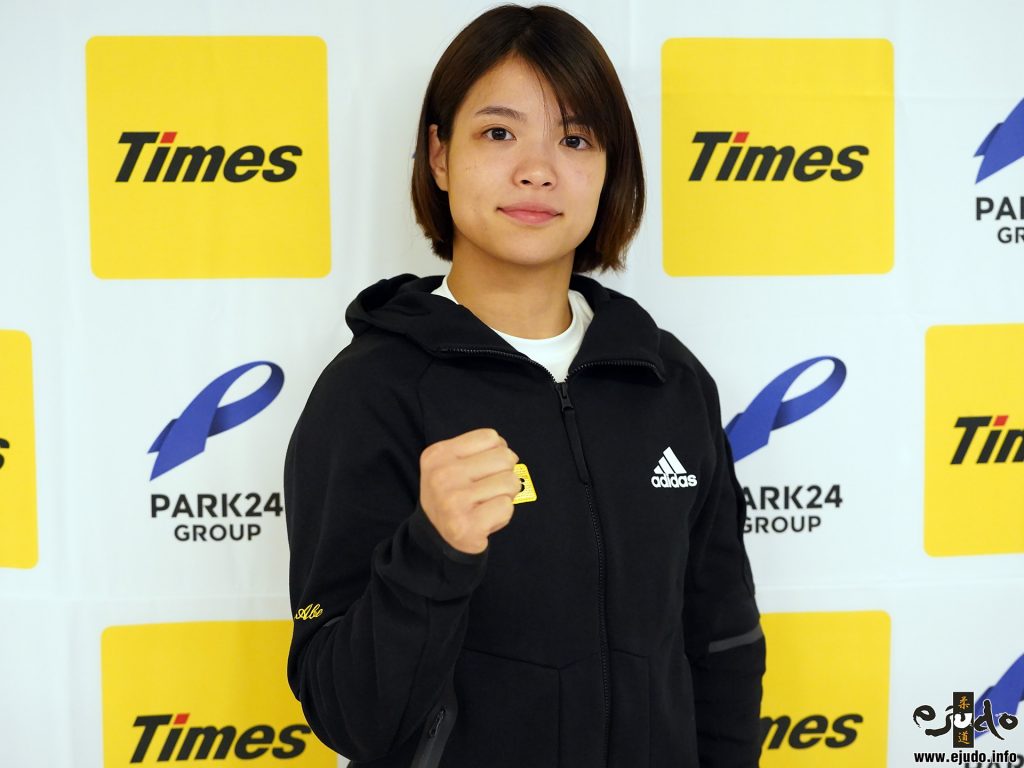
On April 10, Uta ABE, who will compete in the Doha World Judo Championships (May 7-14) in the women’s -52kg division, spoke to the press at the Park24 dojo, where she has been a member since April.
Abe positioned this event as “a tournament that will bring me closer to the Paris Olympics if I win “. And said ” This year is the year before the Olympics, and my overseas rivals will be stepping up their game. Their research and countermeasures against my judo will be more advanced, and I think this will be the most difficult tournament for me so far. However, I hope to win by performing courageous judo.”
A summary of her comments is below. She spent a long time carefully answering questions from the press about her current points of strength and her views on judo.
Uta Abe’s comment for Doha World Championships. (Summary)
Q. What kind of schedule do you have for training now? Also, how are your feelings toward the World Championships?
I have just been training hard at a training camp held at Ryukoku University in Kyoto until recently. I have had good practice. The seeding order is almost finalized after the last tournament, so I have been practicing while imagining my opponents. With less than a month to go until the competition, I feel that I am getting closer to the competition, and I am more enthusiastic about it.
Q. What is the value of the Doha World Championships for you?
If I win, I will be very close to the Paris Olympics team. My fourth consecutive championship is at stake, but it is not easy to win. I imagine it will be the most difficult competition for me so far. (-Q. Because your rivals have thoroughly prepared you?) Yes, I am. There are more and more opponents who are difficult to fight, not only in the games but also in the training camps. In various situations, I realize that my opponents are taking countermeasures against me. Also, the year before the Olympics, overseas players step up their game. I don’t think it will be easy to win, but I want to win by doing courageous judo. I want to find a new me. My theme for this World Championships is courage.
Q. If you win, there is the possibility that you could be the fastest Japanese athlete overall to qualify for the Paris Olympics.
At the Grand Slam Osaka in 2019, I was too conscious of being selected for the national team, so I could not do good judo. So this time, I will focus on the competition in front of me, not so much on the Olympics.
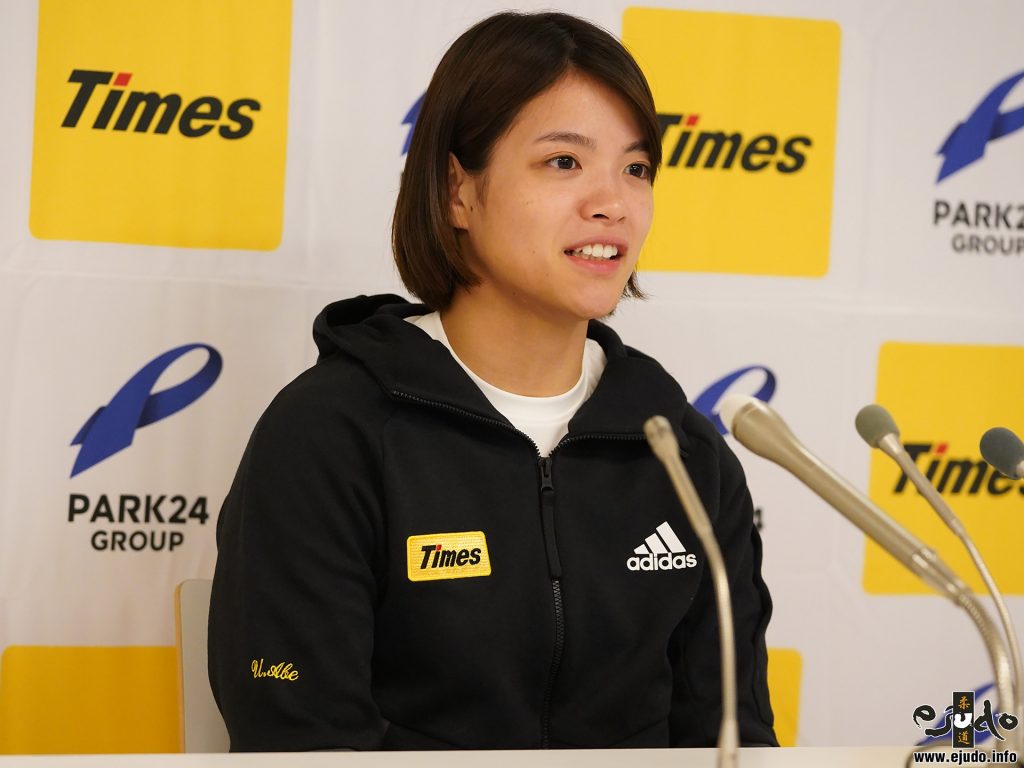
Q. How is your condition?
Physically, I have no worries, and I am finishing well. At the end of last year, I had some problems with my mentality; I had the World Championships in October and the Grand Slam Tokyo in December, so my mentality was fatigued. Around February of this year, I naturally switched on. I feel that my awareness has changed for the Paris Olympics.
Q. What kind of technical improvements do you plan to make?
One is still working on Ashi-waza as before. The other is to increase my kumi-kata. In the past I was not able to do orthodox style fighting with Tsuri-te grabing the opponent’s front lapel, but I started working on it around the Tokyo Olympics, and recently I started to feel a sense of control. My Ashi-waza became successful in this state. I don’t believe that I can keep winning only with both sleeves, which is my forte. I want to increase my kumi-kata variations and be able to overcome any opponent. I also take care of how I handle my body against left-style opponents. I watch video of my matches every day and discuss them with my coach, so there are many more detailed areas for improvement. For example, I check and think about “uke” (*how to catch the opponent’s technique) in response to the opponent’s kumi-kata.
Q. I understand that the forefront of your self-improvement is to increase Ashi-waza and “holding point” patterns. What are the advantages of judo with grabbing the front or side lapel ?
A. It is easier to set up Ashi-waza. This means that it is easier to create situations where big moves can be performed. Also, if my opponent does not want me to grab her by the front collar, I can easily hold her back or both sleeves. It makes my current style work more effectively.
Q. You have long advocated becoming a “good player both standing and on the ground” and have increased your finishing holds year after year. Do you have a vision for how old you will be and in what form your judo will be perfected?
Right now, my policy is to create “judo that is absolutely winnable, with no element of defeat,” in preparation for the Paris Olympics. I am aiming for a judo that can overcome any way my opponent attacks me and that I can attack from any form. However, the more I learn about judo, the more profound it becomes, and the more I wonder if it will ever be completed. Up until the Tokyo Olympics, I was doing judo without looking beyond, simply aiming to become stronger. While that is important, my current aim is a little different. I want to improve my technique and raise the quality of my judo itself. When I think about it, there are still many things I need to learn. Every day, I discover that I am still unable to do so, and I am faced with the fact that there are many techniques that I cannot do. My image of myself before the Tokyo Olympics was a sense that I was adding large branches to the thick trunk of a tree, but now it is different. I am adding fine branches. Judo is really deep.
Q. Is there any technique you would like to try in the future, if not right now?
I would like to learn one low left Katsugi-waza (*Seoi-nage , Sode-tsurikomi-goshi or Ippon-seoi-nage and similar techniques ) and one sutemi- waza (*sucrifice technique). Also, I would like to learn Osoto-gari that grasping the front lapel with my tsuri-te. This is actually not being done at the moment. (Q. Do you want to be able to do Ashi-waza and Osoto-gari from the same position?) That’s right.
Q. You graduated from Nippon Sport Science University in March and be a member of Park24 from April.
Since I am no longer a student, I will take on judo with the responsibility of a professional athlete. (Q. There are many great senior athletes at Park24. Do you take any advice from them?) I watch Naohisa Takato’s training and study the timing of kumite and Ashi-waza, and how to apply them. His judo is really high level. For example, how he makes his kumite, what kind of hold he chooses, and in what way he conveys power to his opponent. His techniques are very dense and precise. It is too precise for me to imitate. And the most amazing thing about him is that he knows his judo perfectly down to the smallest detail. There is a logical reason for every state and every action. He perfectly understands how to deal with his opponent’s actions, and it is ingrained in his body. He does not often give me advice directly. However, I study by listening to conversations between my own brother ( Hifumi Abe ) and Takato. It is very stimulating.
Q. How strong are you now compared to the Tokyo Olympics?
I feel that I am 120% stronger now than I was in Tokyo. I feel it especially when I do Ran-dori. (Q. What is the 20 percent increase?) First of all, my shoulders. I had been dealing with a shoulder injury for a long time. Until the Tokyo Olympics, my range of motion and the angles I could use were extremely limited. I was also forced to exert unnatural force to prevent dislocation. After the Tokyo Olympics, I had shoulder surgery and no longer had to worry. I spent less time dealing with injuries and pain, and I was able to devote those resources to judo itself. Naturally, my physical strength has also increased. Second, I would like to mention my mental growth. I decided that I would win the Tokyo Olympics, made a plan, and actually won the gold medal. The fact that I overcame that grueling process itself gave me confidence. I feel that this process has taken me to another level.
Q. At the beginning of your speech, you said that you “want to find a new me. What is your new self?
I think that if I can show even one technique that I have been practicing in addition , then that is the new me.
Q. How do you feel about the Doha World Championships?
With the Paris Olympics approaching, I am more motivated than last year. It will be a tough competition, but I want to win it all to find a new me.
